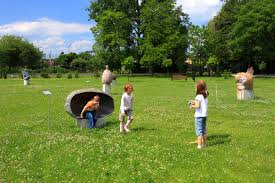The relationship between playground activity and the promotion of children’s self-esteem.
There is a general consensus that physical activity reduces the risk of psychological problems in children and improves their self-esteem. This consensus is reflected in the Chief Medical Officer’s report (Department of Health, 2004), which stated that a review of available research suggests that the health benefits of physical activity in children are predominantly seen in the amelioration of risk factors for disease, avoidance of weight gain, achieving a peak bone mass and mental well-being.
How might playgrounds reduce the risk of psychological problems in children and promote self-esteem? Evidence suggests that children who participate in physical activity improve their self-esteem. Indeed, Ekeland, Heian and Hagan (2005) and Gruber (as cited in Biddle and Mutrie, 2001, p186) found that exercise programmes had a significant positive effect on children’s self-esteem. Moreover, commentators argue that the quality of a child’s exercise experience can affect their self-esteem. Ajzen TPB (1991) promotes the notion that children’s self-esteem is enhanced through the encouragement of physical mastery and self-development.
 It can be seen that playgrounds provide an ideal opportunity for children to master physical skills, such as learning to swing, balance and climb. Personal development may be gained through the enhancement of skills, such as playing, communicating and cooperating with other children and adults in the playground. It can also be seen that public and private playgrounds act as a preventative health measure amongst young people because they promote physical activity at a stage in children’s lives when they are active and not yet at risk from opting out of physical activity.
It can be seen that playgrounds provide an ideal opportunity for children to master physical skills, such as learning to swing, balance and climb. Personal development may be gained through the enhancement of skills, such as playing, communicating and cooperating with other children and adults in the playground. It can also be seen that public and private playgrounds act as a preventative health measure amongst young people because they promote physical activity at a stage in children’s lives when they are active and not yet at risk from opting out of physical activity.An important message I take from this research is that children’s self-esteem may be enhanced through early positive exercise experiences that contain challenge, fun and excitement! I can’t think of a better place for children to gain positive exercise experiences other than a well designed playground or play area in the community or the back garden!
Nicky Michelmore BSc Hons Psychology, Postgraduate Diploma Sport & Exercise Psychology (Co-Director & Website Designer of Playscapes Design Ltd)
References
Ajzen, I. (1991). The theory of planned behaviour. Organisational Behaviour and Human Decision Processes, 50, 179-211.
Biddle, S. J., & Mutrie, N. (2001). Psychology of physical activity: Determinants, well-being and interventions. Abingdon: Routledge.
Ekeland, E., Heian, F., & Hagen, K.B. (2005). Can exercise improve self-esteem in children and young people? A systematic review of randomised controlled trials. British Journal of Sports Medicine, 39, 792-798. Department of Health (2004). The benefits of regular physical activity. A report from the Chief Medical Officer. At least five days a week: evidence on the impact of physical activity and its relationship to health. Retrieved September 25, 2006 from http://www.dh.gov/PublicationsAndStatistics/Publications/ PublicationsPolicyAndGuidance/PublicationsPolicyAndGuidanceArticles/fs/en?CONTENT_ID=40809948chk=1Ft1Of.

